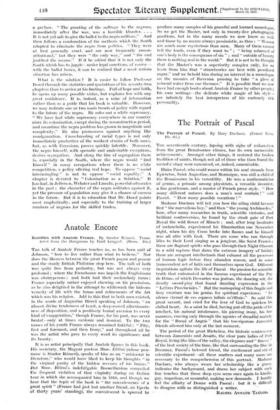The Portrait of Pascal The Portrait of Pascal. By Mary
Duclaux. (Ernest Bean. 10s. 6d.) TOE seventeenth century, lapsing with sighs of exhaustion from the great Renaissance climax, has its own memorable
achievements. Amongst other things, it restored the broken tradition of saints, though not all of those who then found the sacred erstasy were canonized, or, indeed, canonizable.
Blaisc Pascal, who could weave within his soul strands front Epictetus, Saint Augustine, and Montaigne, was still a child of the Renaissance in his versatility. He was a mathematician of genius, a primate among physicists, a versatile inventor, a fine gentleman, and a master of French prose style. "how many different natures does a man's soul contain ! " said Pascal. "How many possible vocations!"
Madame Duclaux will tell you how the ailing child became first" the marvellous boy," and then "the young Archimedes," how, after many researches in truth, scientific victories, and brilliant controversies, he found by the strait gate of Port Royal the wild flower of Miracle ; and, after long lassitudes of melancholia, experienced his Illumination one November night, when his dry Cross broke into flames and he himself was all afire with God. There are some who run through lilies to their Lord singing as a jongleur, like Saint Francis ; there are flagrant spirits who pass through their Night Obscure to a wild rapture that dares the extreme imagery of bridal; there are arrogant intellectuals that exhaust all the processes of human logic before they abandon reason, and in sonic transcendent act of faith cast themselves upon God. Different inspirations agitate the life of Pascal—the passion for scientific truth that culminated in the famous experiment of the Puy de Dome, of which Descartes was jealous, the dancing wit, the deadly sword-play that found dazzling expression in the " Lettres Provinciales." But the mainspring of this fragile and fiery creature was his genius for spiritual experience. Lc silence (term' de ces espaces infinis m'effraie." So said this great savant, and cried for the love of God to quicken his chilled heart. As a saint he died, having put off the pride of his intellect, his _natural intolerance, his piercing irony, his fine manners, craving only through the agonies of dreadful malady for the "Bread of Angels" that • his too-rigorous Jansenist friends allowed him only at the last moment.
The period of the great Richelieu, the historic controversy between Jansenists and Jesuits, the clear pure ladies of Port Royal, living like lilies of the valley, the elegance and" finesse" of the best society of the time, like that surrounding the Due de Roannez, Pascal's beloved friend, the excitement and stir of scientific experiment—all these -matters- and many More are necessary to the comprehension of this portrait. Madame Duclaux, who always wears her' scholarship like a grace, indicates the background, and draws her subject. with such fine touches that those deep eyes seem .once again to kindle, gay, imperious, or mournful, making new demands. I hardly feel the affinity of Donne with Pascal : but it is difficult to disagree With 'so distinguished a Writer.






























































 Previous page
Previous page